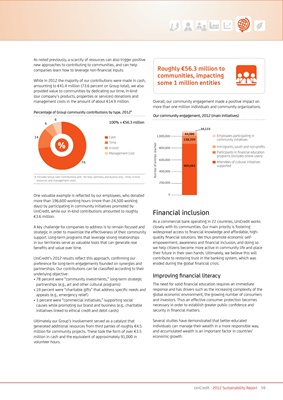
As noted previously, a scarcity of resources can also trigger positive
new approaches to contributing to communities, and can help
companies learn how to leverage non-financial inputs. Roughly €56.3 million to
communities, impacting
While in 2012 the majority of our contributions were made in cash,
amounting to €41.4 million (73.6 percent on Group total), we also
some 1 million entities
provided value to communities by dedicating our time, in-kind
(our company’s products, properties or services) donations and
management costs in the amount of about €14.9 million. Overall, our community engagement made a positive impact on
more than one million individuals and community organizations.
Percentage of Group community contributions by type, 2012A
Our community engagement, 2012 (main initiatives)
6
6 100% = €56.3 million
34,133
44,986
14 Cash 1,000,000 Employees participating in
138,359 community initiatives
% Time
Number of entities reached
In-kind 800,000 Immigrants, youth and non-profits
Management Cost Participants in financial education
programs (includes online users)
600,000
74 Attendees of cultural initiatives
900,083 supported
400,000
A. Includes Group cash contributions and - for Italy, Germany and Austria only - time, in-kind
resources and management costs.
200,000
One valuable example is reflected by our employees, who donated 0
more than 196,600 working hours (more than 24,500 working
days) by participating in community initiatives promoted by
UniCredit, while our in-kind contributions amounted to roughly
€3.6 million.
Financial inclusion
As a commercial bank operating in 22 countries, UniCredit works
A key challenge for companies to address is to remain focused and closely with its communities. Our main priority is fostering
strategic in order to maximize the effectiveness of their community widespread access to financial knowledge and affordable, high-
support. Long-term programs that leverage strong relationships quality financial solutions. We thus promote economic self-
in our territories serve as valuable tools that can generate real empowerment, awareness and financial inclusion, and doing so
benefits and value over time. we help citizens become more active in community life and place
their future in their own hands. Ultimately, we believe this will
UniCredit’s 2012 results reflect this approach, confirming our contribute to restoring trust in the banking system, which was
preference for long-term engagements founded on synergies and eroded during the global financial crisis.
partnerships. Our contributions can be classified according to their
underlying objective:
• 78 percent were “community investments,” long-term strategic
Improving financial literacy
partnerships (e.g., art and other cultural programs) The need for solid financial education requires an immediate
• 19 percent were “charitable gifts” that address specific needs and response and has drivers such as the increasing complexity of the
appeals (e.g., emergency relief) global economic environment, the growing number of consumers
• 3 percent were “commercial initiatives,” supporting social and investors. Thus an effective consumer protection becomes
causes while promoting our brand and business (e.g., charitable necessary in order to establish greater public confidence and
initiatives linked to ethical credit and debit cards) security in financial matters.
Ultimately our Group’s involvement served as a catalyst that Several studies have demonstrated that better-educated
generated additional resources from third parties of roughly €4.5 individuals can manage their wealth in a more responsible way,
million for community projects. These took the form of over €3.5 and accumulated wealth is an important factor in countries’
million in cash and the equivalent of approximately 91,000 in economic growth.
volunteer hours.
UniCredit · 2012 Sustainability Report 59